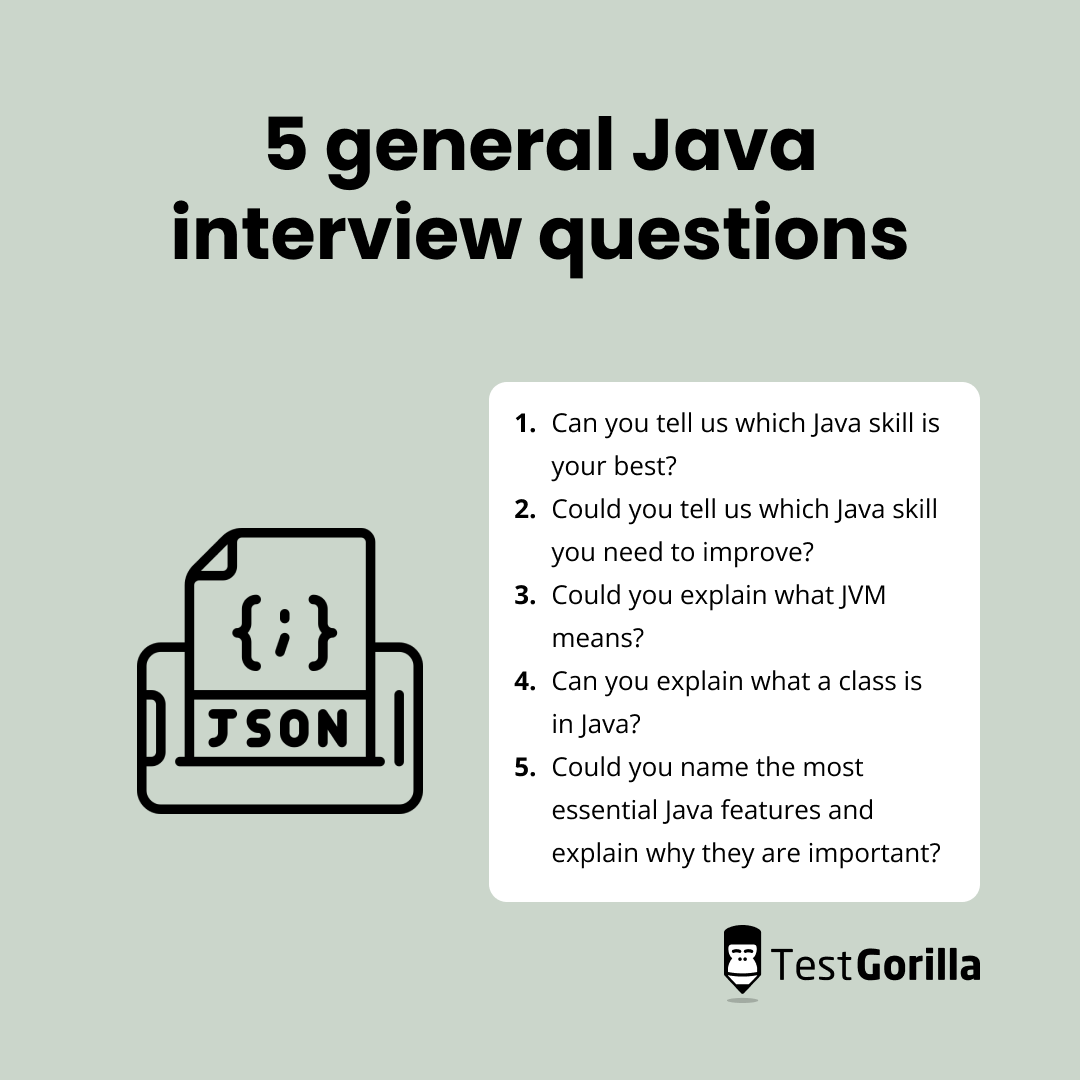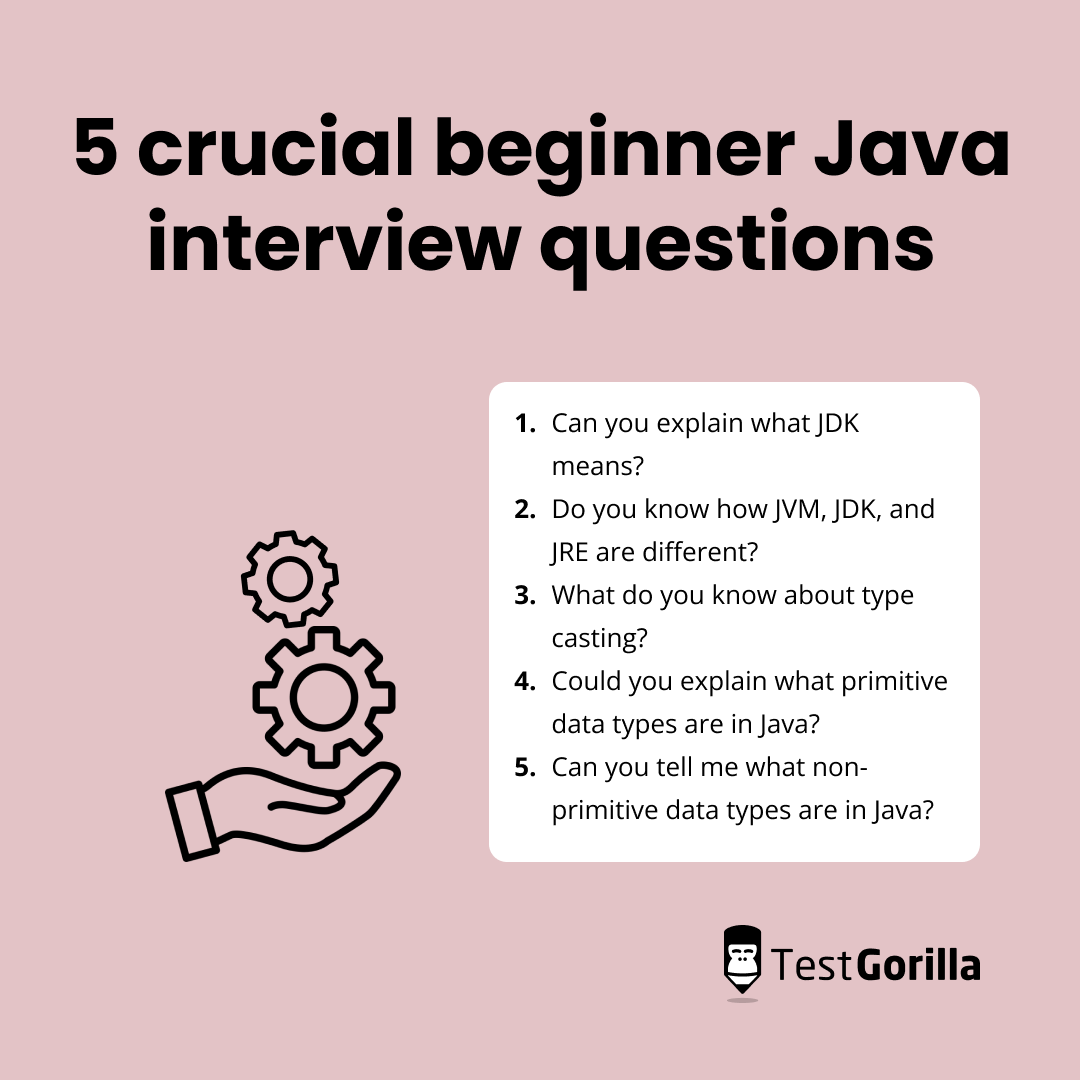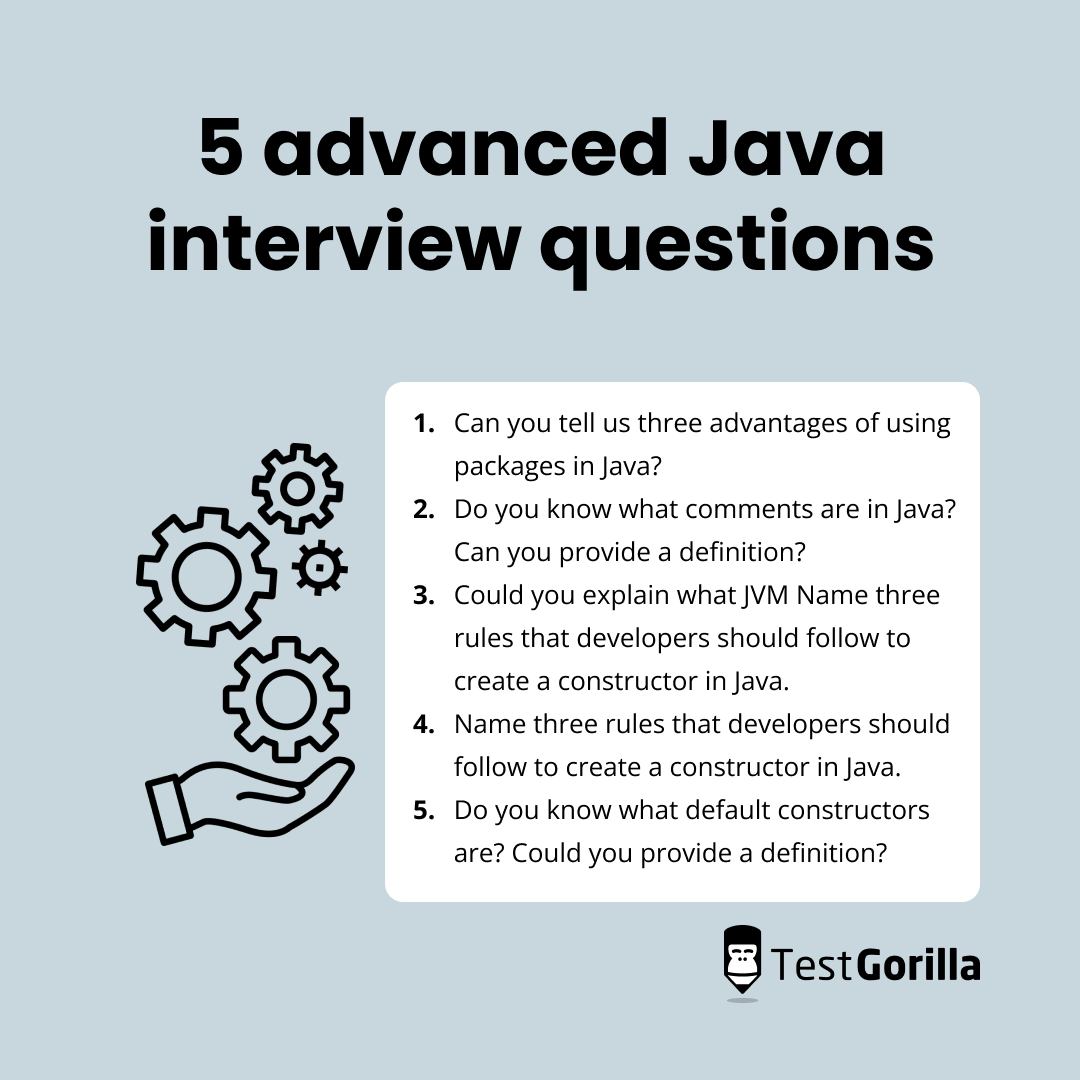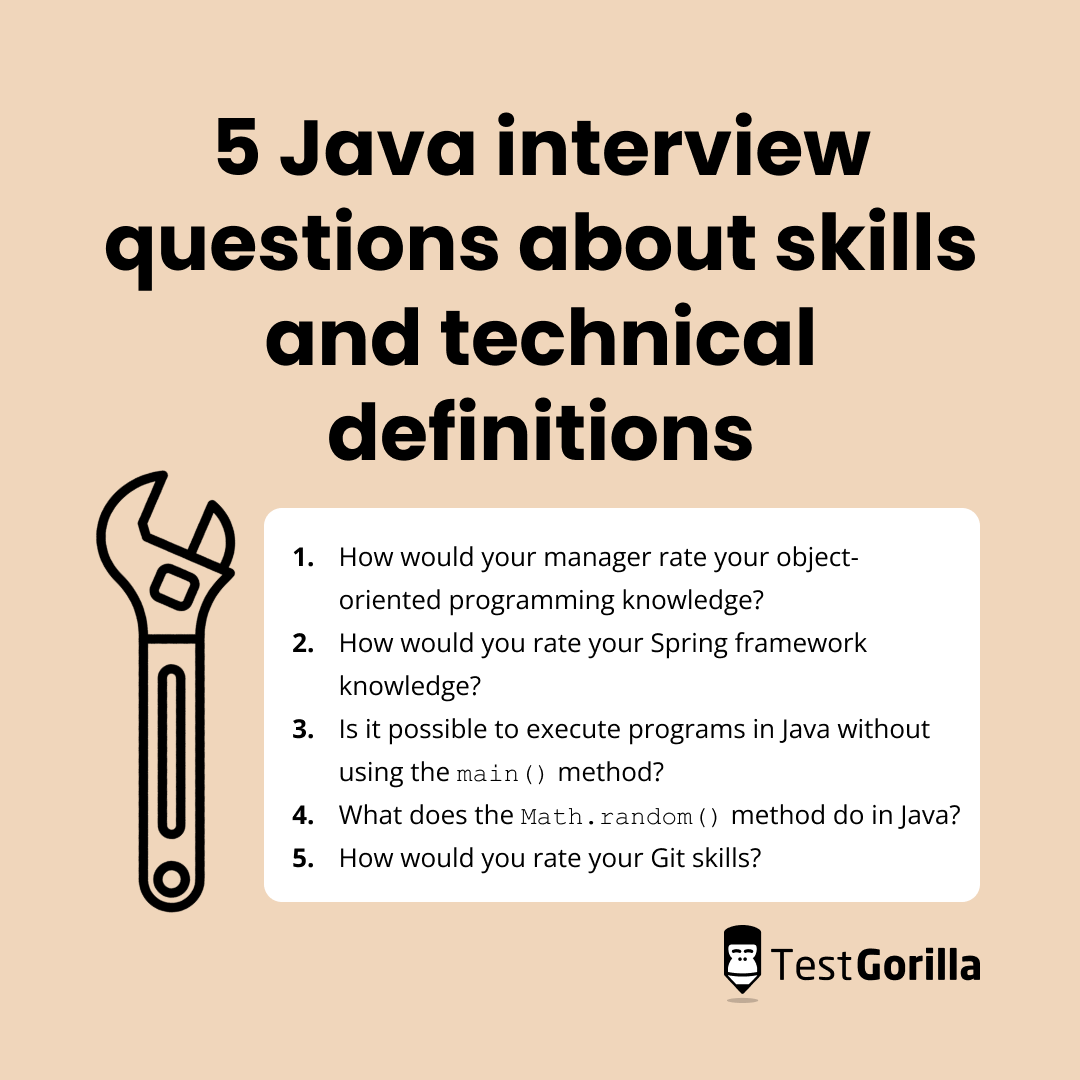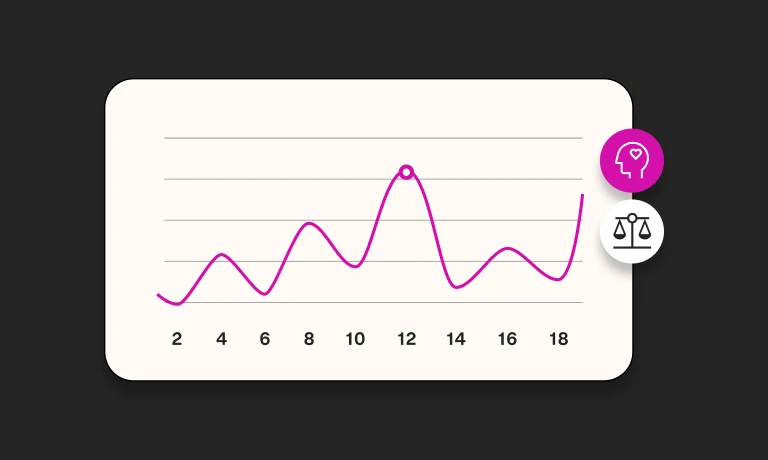100+ Java interview questions and answers for hiring programmers
Are you hiring a Java developer for your team, but finding it difficult to assess your candidates to find the perfect match?
Using a combination of skill tests and the right Java interview questions is a handy method that enables you to:
Make sure that applicants match your requirements
Streamline the hiring process
Find the ideal candidate for the position
This strategy is fast and simple. Simply use our universal coding tests to assess applicants’ skills and shortlist the best. You can then invite shortlisted candidates to an interview to discuss the role and learn more about their skills.
During the interview, asking the right questions is crucial – but if you don’t have a list yet, don’t worry. We’ve put together 100+ Java interview questions to help you find a top developer for your team.
Table of contents
- 19 general Java interview questions to ask candidates
- 5 general Java interview questions and answers
- 19 beginner Java interview questions to ask junior developers
- 5 crucial beginner Java interview questions and sample answers
- 51 advanced Java interview questions to ask senior developers
- 5 advanced Java interview questions and sample answers
- 14 technical and skill-related interview questions to ask applicants
- 5 Java interview questions and sample answers about skills and technical definitions
- For which roles can you use those Java interview questions?
- Evaluate developers for your company with Java interview questions
19 general Java interview questions to ask candidates
Ask your candidates some of these 19 Java interview questions to get a general idea of their Java knowledge.
1. Can you explain what Java is?
2. Could you give us a definition of objects in Java?
3. Can you tell us how many operator types there are in Java?
4. Could you give me a definition of bitwise operators in Java?
5. What do you know about control statements in Java?
6. Can you explain the main OOP concepts?
7. What do you know about static variables?
8. Can you explain what virtual functions are?
9. Are virtual functions available in Java?
10. Can you explain how C is different from Java?
11. Could you explain some new concepts that were introduced in Java in the past years?
12. What are the differences between C++ and Java?
13. Could you name the most essential Java features and explain why they are important?
14. Can you explain what a class is in Java?
15. Can you explain to us what an object is in Java?
16. Could you explain what JVM means?
17. Describe your Java programming experience.
18. Can you tell us which Java skill is your best?
19. Could you tell us which Java skill you need to improve?
5 general Java interview questions and answers
Below, you’ll find sample answers to five of the general Java interview questions. Use them to assess your candidates’ responses.
1. Can you tell us which Java skill is your best?
Each candidate is likely to have a Java-related skill that they consider to be their strongest, which helps them create apps using this programming language.
For example, some applicants might mention that their clean-coding skills help them to complete projects efficiently. Others may explain that their debugging skills help them fix bugs and ensure the code runs without errors.
If you need to assess your applicant’s clean-coding or Java-debugging skills, use our Clean Code and Java Debugging tests.
2. Could you tell us which Java skill you need to improve?
All applicants should want to improve their skills to increase their productivity, have the professional awareness to notice gaps in their skill set, and have a plan to address them.
Whether they need to improve their knowledge of Java data structures or object-oriented programming, they should have techniques in place to hone their abilities.
You can assess your applicants’ skills with skills tests (for example, you could use our Java Data Structures and Object-oriented Programming tests). In addition to that, ask them how they plan to upskill. Some candidates may prefer to take online courses, while others might want to improve their skills in their free time by working on side projects.
3. Could you explain what JVM means?
Skilled programmers should know that JVM is short for Java Virtual Machine, which provides developers a runtime environment to execute code. Programmers can use the JVM to convert bytecode into machine-level language and allocate memory to programs.
4. Can you explain what a class is in Java?
A class is a blueprint or template that developers use to create objects and define object methods. Classes in Java determine how objects behave and what they contain.
Applicants who understand Java classes will also know that a class doesn’t occupy memory and can contain the following:
Data members
Constructors
Nested classes
5. Could you name the most essential Java features and explain why they are important?
Java has several unique features that enable developers to easily create programs with it. Applicants should be able to describe a few of them, such as Java’s:
Adaptability: Java is a dynamic programming language that can adapt to evolving code environments
Security: Java is secure and provides a platform in which programmers can create virus-free programs
Use of object-oriented programming: The Java programming language is object-oriented and relies on objects and classes
The best insights on HR and recruitment, delivered to your inbox.
Biweekly updates. No spam. Unsubscribe any time.
19 beginner Java interview questions to ask junior developers
Test your junior developers’ knowledge by asking them a few of these 19 beginner Java interview questions during the interview.
1. Could you name the main memory areas that the JVM allocates?
2. What do you know about class loaders in Java?
3. Could you explain what JDK means?
4. What do you know about JRE?
5. Do you know how JVM, JDK, and JRE are different?
6. Could you explain to us what the JIT compiler is in Java?
7. Can you tell us what local variables are in Java?
8. Could you explain what instance variables are in Java?
9. What do you know about type conversion?
10. Could you explain what primitive data types are in Java?
11. Can you tell me what non-primitive data types are in Java?
12. Do you know what the Unicode system is?
13. Could you explain why engineers introduced the Unicode system in Java?
14. Explain if local variables have any default values.
15. What do you understand about operator precedence in Java?
16. Do you know what the logical NOT operator does in Java?
17. Do you know what the logical OR operator does in Java?
18. Can you explain what the logical AND operator does in Java?
19. What do you know about type casting?
5 crucial beginner Java interview questions and sample answers
Check our sample answers to the five most important Java interview questions for junior developers. Use them to review your candidates’ responses.
1. Can you explain what JDK means?
Junior Java developers should know that JDK is short for Java Development Kit.
This technology package enables programmers to run Java programs on Java Virtual Machines and in a Java Runtime Environment. Developers use this kit to implement specifications in Java, such as class libraries and a compiler.
2. Do you know how JVM, JDK, and JRE are different?
Applicants should be able to explain how these packages are different. They may first explain that JDK (Java Development Kit) is a development kit that provides developers with an environment to execute Java programs. They should then explain that developers use the JRE (Java Runtime Environment) to run programs and JVM (Java Virtual Machine) to access a runtime environment and run bytecode.
3. What do you know about type casting?
Programmers use type casting to convert one data type into another.
For example, they might convert a smaller data type into a larger-sized data type, or a larger data type into a smaller-sized data type. These type casting methods are known as widening and narrowing, respectively.
4. Could you explain what primitive data types are in Java?
A primitive data type is a key component of data manipulation. It is a basic data type that is available in Java. Consider whether your applicants can name a few examples of primitive data types to determine if their knowledge matches your expectations.
Some primitive data types they could mention include:
INT
CHAR
BYTE
FLOAT
BOOLEAN
5. Can you tell me what non-primitive data types are in Java?
Non-primitive data types are objects that developers create by instantiating a class. Programmer applicants should know that engineers call them “reference types” and should also be able to name a few examples, such as:
Strings
Arrays
Interface
Classes
51 advanced Java interview questions to ask senior developers
Ask senior Java developers some of these 51 advanced Java interview questions to test their expertise.
1. Could you explain the difference between the a++ and ++a increment operators?
2. What do you know about the ternary operator in Java?
3. Can you tell me what you know about Java keywords?
4. Are you familiar with access specifiers?
5. What is the public access specifier?
6. What is the private access specifier?
7. What is the protected access specifier?
8. What is the default access specifier?
9. Could you explain what packages are in Java?
10. Can you tell us three advantages of using packages in Java?
11. Do you know the three types of control statements? Could you name them?
12. What do you know about selection statements in Java?
13. What do you know about iterative statements in Java?
14. Could you explain what jump statements are in Java?
15. Can you explain what loops are in Java?
16. Could you tell us what infinite loops are in Java?
17. What do you know about the break and continue statements?
18. Does the main() method return data in Java?
19. Could you explain why developers call strings in Java immutable?
20. Do you understand the difference between vectors and arrays?
21. What do you understand about multi-threading?
22. How would you implement multi-threading in Java?
23. How does Java complete garbage collection?
24. Explain how you would make a copy of Java objects.
25. Could you explain what a stack is in Java?
26. Can you explain what a queue is in Java?
27. Do you know the difference between a stack and a queue in Java?
28. Could you explain the different states of threads?
29. Is it possible to restart a dead thread in Java?
30. Does garbage collection in Java mean Java programs can’t run out of memory?
31. How does Java store objects?
32. Can you explain what an anonymous class is in Java?
33. Do you understand what local classes are in Java? Can you provide a definition?
34. What does the throw keyword do in Java?
35. Can you explain what the FOR EACH loop does in Java?
36. Could you explain what the WHILE loop does in Java?
37. Can you explain to us what the DO-WHILE loop does in Java?
38. Do you know what comments are in Java? Can you provide a definition?
39. Can you explain what documentation comments are in Java?
40. Could you tell us what multi-line comments are in Java?
41. Could you tell me what single-line comments are in Java?
42. Name two rules that developers should follow to declare a class.
43. Could you explain what constructors are in Java?
44. Name three rules that developers should follow to create a constructor in Java.
45. Do you understand what default constructors are? Could you provide a definition?
46. What do you know about parameterized constructors?
47. Explain if a constructor returns any values.
48. Is it possible for subclasses to inherit constructors?
49. Is it possible to overload a constructor?
50. What is the purpose of the constructor class in Java?
51. Can you explain the Java naming conventions?
5 advanced Java interview questions and sample answers
See the sample answers to our selection of the five most important Java interview questions for senior developers. Use them to assess your applicants’ responses and see who meets your needs.
1. Can you tell us three advantages of using packages in Java?
Expert Java developers will know that packages in Java offer several advantages. Packages enable developers to:
Avoid name clashes
Get easier access control
Locate related classes easier
Some applicants might also mention other advantages. For example, they may explain that developers can use Java packages to categorize classes and interfaces and maintain them with minimal effort.
2. Do you know what comments are in Java? Can you provide a definition?
A Java comment provides developers with information about statements, classes, variables, and methods. They can make it easier to read Java code and prevent execution when developers test alternative code. Some examples of Java comments that your applicants might mention include:
Multi-line comments
Single-line comments
Documentation comments
3. Name three rules that developers should follow to create a constructor in Java.
Knowing the rules to create constructors in Java is important for Java developers.
The rules ensure programmers create the constructors successfully, so check if your applicants can provide a few examples of them, such as:
Developers cannot synchronize a constructor in Java
Constructors cannot be abstract, final, or static
Constructors don’t have an explicit return type
If applicants are familiar with constructors, they might mention that there are two types of constructors in Java: default and parameterized. Look for responses that explain how the rules help developers create these types of constructors.
4. Explain if a constructor returns any values.
Applicants should understand that a constructor does not return values in Java. If they have sufficient experience, they will know that constructors return current instances of the classes to which they belong. Skilled applicants may also explain that programmers cannot use a return type with Java constructors.
5. Do you know what default constructors are? Could you provide a definition?
Compilers create default constructors when a programmer has not created one themselves. A default constructor’s job is to initialize an object’s attributes. They use their default values and call the superclass constructor to achieve this goal.
14 technical and skill-related interview questions to ask applicants
Ask your applicants some of these 14 technical and skill-related interview questions to learn more about their technical knowledge.
1. Could you explain how constructors are different from methods?
2. Can you tell us what the method signature is in Java?
3. Do you understand what a static block is in Java?
4. Is it possible to execute programs in Java without using the main() method?
5. Can you explain what a singleton class is in Java?
6. What does the Math.random() method do in Java?
7. Name two ways you can overload a method.
8. Could you explain what the super keyword is in Java?
9. Can you explain why Java doesn’t support pointers?
10. Is it possible for programmers to override static methods?
11. How would your manager rate your object-oriented programming knowledge?
12. How would you rate your Git skills?
13. Is attention to detail important for Java developers?
14. How would you rate your Spring framework knowledge?
5 Java interview questions and sample answers about skills and technical definitions
Use the sample answers to these five Java interview questions to review your candidates’ responses and evaluate their technical expertise.
1. How would your manager rate your object-oriented programming knowledge?
Candidates should have top object-oriented programming knowledge to ensure that they can improve the reusability and readability of the code. If your applicants understand object-oriented programming concepts, they will be able to mention the four principles of this model:
Abstraction
Encapsulation
Inheritance
Polymorphism
They should also know that Java is an object-oriented programming language, meaning that it’s ideal for creating modular programs.
If you need to evaluate your applicants’ object-oriented programming knowledge, you can take advantage of our Object-oriented Programming test.
2. How would you rate your Spring framework knowledge?
Spring framework knowledge is essential for Java developers. The framework provides comprehensive infrastructure support for developers who want to create Java applications.
Listen out for responses that explain the key advantages of Spring. The framework enables developers to:
Create scalable applications
Create secure applications
Solve real-time technical problems
Responses that mention these advantages are a proof of the candidates’ expertise, but you can also use our Java Spring test to evaluate their skills.
3. Is it possible to execute programs in Java without using the main() method?
Executing programs in Java without using the main() method is possible. Senior-level candidates should know developers can use static blocks to achieve this goal.
They may also explain that this strategy is possible with JDK versions before JDK 1.6 and that with JDK 1.7, it’s impossible.
4. What does the Math.random() method do in Java?
Applicants should know that the Math.random() method enables programmers to generate pseudo-random double-type numbers in Java. The best candidates will explain that the numbers programmers can generate with this method range between 0.1 and 1.
5. How would you rate your Git skills?
Your applicants must understand what Git is and know how to use it.
Most applicants will know that this version control tool helps developers handle large and small projects alike and efficiently manage source code. Check if your candidates have experience in tracking source-code changes in Git and in working with several developers on non-linear development.
You can also use our Git skill test to evaluate applicants’ knowledge and experience.
For which roles can you use those Java interview questions?
You can use the Java interview questions from this article to learn more about applicants applying for Java developer roles, or for any role requiring Java programming.
We have grouped the questions listed above into different difficulty levels. It’s important to use questions that match the skill and experience level required for each role; for example, use basic Java interview questions to assess junior Java developers, and advanced questions to evaluate senior Java developers. And, if you need to assess candidates’ Java 8 skills in particular, check out our Java 8 interview questions.
With this method, you can make sure your candidates feel comfortable during interviews. This also helps enhance the candidate experience, while also ensuring that you can hire the best candidate for the job.
Evaluate developers for your company with Java interview questions
Hiring decisions that are driven by data and backed by well-planned interview questions will help you avoid choosing the wrong candidate – and, as we all know, bad hires can be very costly.
If you’re looking for a way to streamline your hiring process, the combination of skill testing and structured interviews is the right choice, because it enables you to gather unbiased information about the abilities of each applicant and make the right hiring choices – while also keeping costs and time-to-hire low.
To help you hire the best Java developers, we’ve created plenty of Java tests you can choose from:
Android Development Using Java test, and more.
Combine them with our personality, role-specific, or cognitive-ability tests to gain a deep understanding of each candidate’s skills, strengths, and potential.
Head on to our test library to pick the best tests for your next skills assessment – or simply try out our free plan to simplify your hiring process and hire the best.
You've scrolled this far
Why not try TestGorilla for free, and see what happens when you put skills first.


